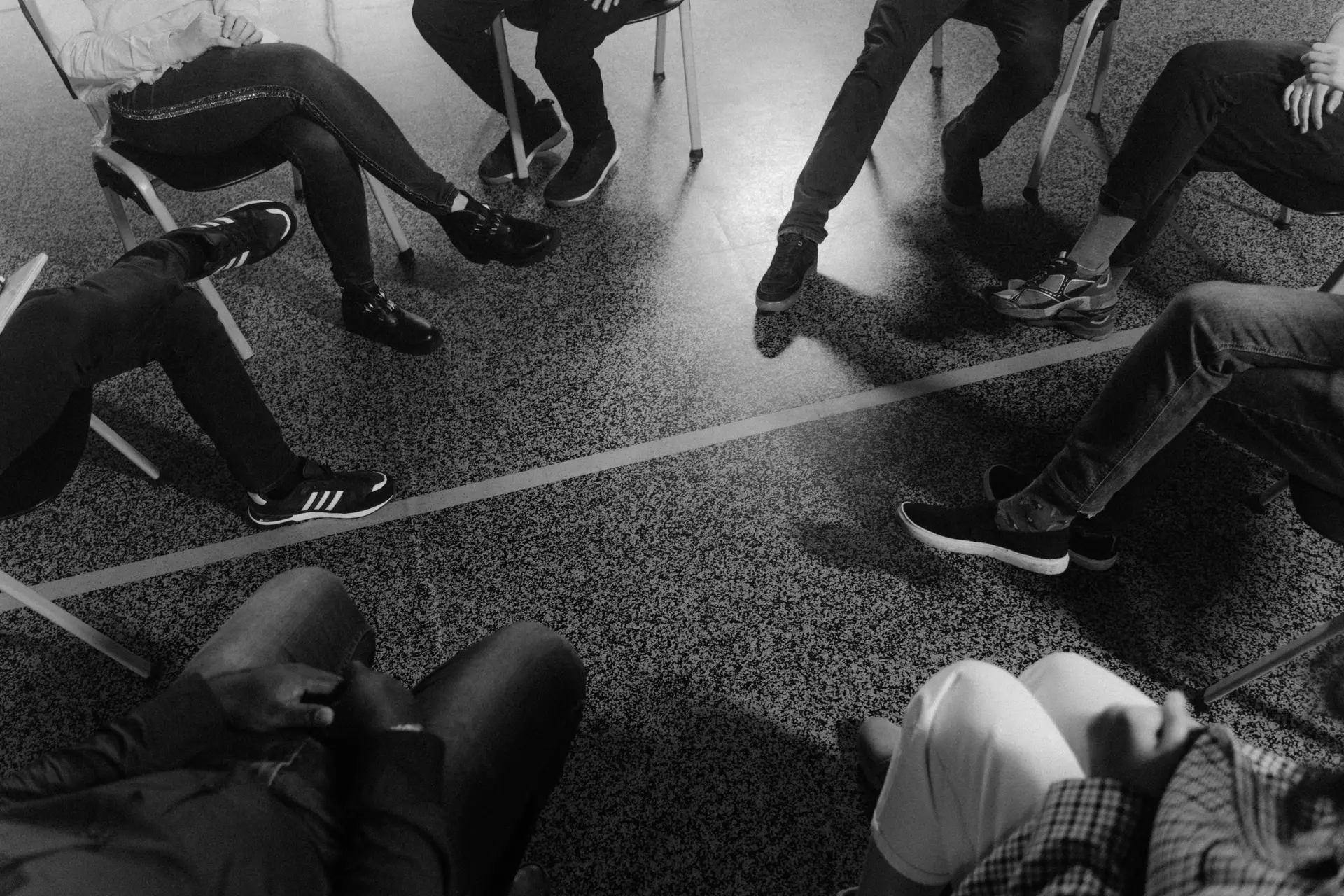SERVICES
Healing and Growth Through Shared Experiences



Navigating life’s challenges can feel overwhelming, but the journey becomes easier when you realize you’re not alone. Group counseling offers a unique and supportive space where individuals come together to share experiences, gain insights, and build meaningful connections—all under the guidance of a professional therapist.
Unlike individual therapy, where the focus is one-on-one, group counseling fosters healing through shared understanding. Whether you’re struggling with stress, anxiety, relationships, self-esteem, or major life transitions, being part of a group can provide comfort, encouragement, and a fresh perspective.




Common Issues That Benefit from Group Counselling
- Anxiety & Stress Management: Group therapy provides coping techniques and peer support for individuals dealing with excessive worry, panic attacks, or generalized anxiety disorder.
- Depression & Mood Disorders: Support from a group can help individuals feel less isolated and learn new strategies for managing low mood, hopelessness, and emotional numbness.
- Grief & Loss: Grief support groups offer a space to process loss, share emotions, and learn ways to navigate life after the death of a loved one.
- Addiction & Substance Abuse Recovery: Group counseling is a core part of recovery programs, helping individuals stay accountable and receive encouragement.
- Relationship & Family Issues: Conflict resolution, communication skills, and boundary-setting are common themes in groups focused on family dynamics and romantic relationships.
- Social Skills & Communication Challenges: Groups designed for individuals with social anxiety, autism spectrum disorder (ASD), or difficulty in relationships help build confidence and improve interpersonal interactions.
- Anger Management: Guided discussions and behavioral strategies help individuals learn how to manage anger in healthier ways and improve relationships.
- Trauma & PTSD: Support groups for survivors of abuse, sexual assault, domestic violence, or military trauma create a safe environment for healing and shared understanding.
- Chronic Illness & Pain Management: Living with a chronic condition can be isolating. Group therapy provides emotional support and practical coping strategies for managing illness.
- Self-Esteem & Personal Growth: Groups that focus on self-worth, confidence, and motivation help individuals develop a more positive self-image and set meaningful goals.
- Parenting Support & Challenges: Parenting groups provide education, emotional support, and strategies for handling the ups and downs of raising children, especially for new parents or those facing unique challenges.
- LGBTQ+ Support Groups: These groups provide a welcoming space for individuals navigating issues related to identity, relationships, coming out, and societal challenges.

Why Choose Group Counselling?
Many people hesitate to join a group because they fear being vulnerable in front of others. However, once they take the first step, they often find unexpected relief and support in the shared experience.
Why group therapy can be so powerful:
- You Realize You’re Not Alone
- A Safe Space for Expression
- Learning Through Shared Experiences
- Building Connection and Support
- Developing New Communication Skills
Transformative Group Therapy Approaches
Support Groups
Common for grief, chronic illness, addiction recovery, and caregiving.
Creates a safe space for individuals with similar experiences to share and support each other.
Mindfulness-Based Therapy Groups
Helpful for managing stress, anxiety, and chronic pain.
Uses mindfulness and meditation techniques to improve emotional well-being.
Expressive Therapy Groups
Particularly beneficial for trauma survivors, children, and individuals with difficulty verbalizing emotions.
Encourages self-expression through creative activities.
Trauma-Informed Therapy Groups
Often used for survivors of abuse, PTSD, and domestic violence.
Focuses on healing past trauma in a safe and supportive setting.
Psychoeducational Groups
Focuses on skill-building and coping strategies.
Provides education on specific topics like stress management, addiction recovery, or trauma.
Interpersonal Process Groups
A dynamic, insight-driven approach that explores relational patterns.
Helps participants understand how their behaviors affect others and vice versa.
Book an Appointment Now!
Taking the first step can be the hardest—but you don’t have to do it alone. Let’s work together to bring clarity, healing, and confidence into your life


The Power of Support: Real Experiences from Real People
Working with Durga has been life-changing. I was struggling with anxiety and self-doubt for years, and through our sessions, I’ve learned how to manage my feelings and take control of my life. The environment is warm, supportive, and non-judgmental, which made it easy for me to open up and explore my emotions. I feel more confident and at peace than ever before.

Charles
/
Client
Frequently Asked Questions
What is group counselling?
Group counseling is a therapeutic process where individuals come together in a supportive setting to share experiences, gain insight, and develop coping strategies under the guidance of a trained therapist. Groups focus on topics such as stress management, self-esteem, relationships, anxiety, trauma, and personal growth. The collective support and shared experiences foster healing, connection, and personal development.
What are the benefits of group counselling?
Group therapy offers a unique opportunity to receive support, feedback, and perspective from others who share similar experiences. It helps individuals feel less alone in their struggles, improves communication and interpersonal skills, and provides new strategies for personal growth and emotional well-being..
Can I bring my own group?
Yes! If you have a group of friends, family members, or colleagues who want to participate in counseling together, we can facilitate a private group session tailored to your specific needs and goals. Whether it’s for workplace stress, family communication, or a shared life transition, customized group sessions can be a powerful tool for healing and connection..
How does a group counselling session work?
In group sessions, members engage in guided discussions, activities, and therapeutic exercises tailored to the group’s needs. The therapist facilitates the conversation while ensuring a safe and respectful environment for everyone. The structure of the group follows key stages, including the forming phase (when members join and set expectations) and the norming phase (when trust is built, and members engage in deeper, more meaningful discussions).
How long does group counselling take?
The duration of group counseling depends on the group’s goals and needs. Some groups are short-term (a few structured sessions focused on a specific issue), while others continue for an extended period to allow deeper personal and relational growth. Your therapist will discuss the best approach and timeline based on your situation.
Is Group counselling confidential?
Yes, confidentiality is a top priority in group therapy. All members are expected to respect each other’s privacy, and the therapist ensures that discussions remain in a safe and protected space. The only exceptions to confidentiality apply in cases where there is a risk of harm to oneself or others, as required by law.
How do I get started?
You can join an existing group that matches your needs, or if you prefer, you can form your own group with people you know. To find out about upcoming group sessions or create a custom group, feel free to reach out for more details..
discover what’s latest





